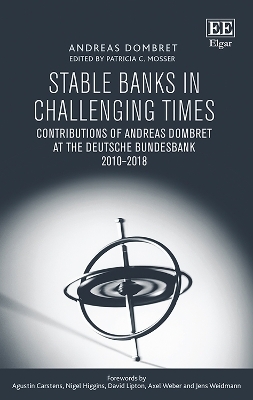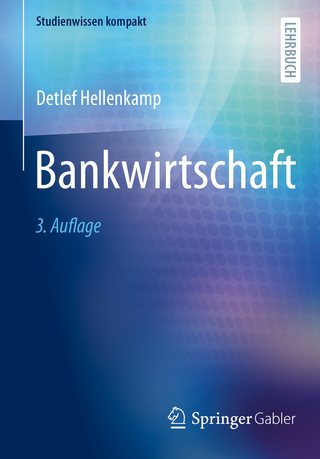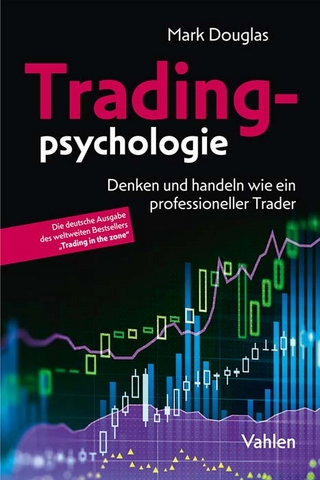
Stable Banks in Challenging Times
Edward Elgar Publishing Ltd (Verlag)
978-1-83910-220-2 (ISBN)
Stable Banks in Challenging Times is a collection of speeches delivered by Andreas Dombret during his eight-year tenure as a board member of the Deutsche Bundesbank, the German central bank, and also, from 2014 onwards, his term on the Supervisory Board of the European Central Bank. He also represented Germany at the G7, the G20, the IMF, the FSB, the Basel Committee, the OECD and the BIS.
As witness to the challenges created by the global financial crisis of 2008, Andreas Dombret helped to shape large parts of the new regulatory framework. He successfully monitored future developments such as digitalization, Brexit and climate change, and their effects on the risk situation in the global banking industry. His insights are an invaluable look at the inner workings of global financial regulation and policy.
Financial system academics and researchers as well as professionals in banking, the financial sector, central banking and bank supervision will gain perspective from the author's observations as they pertain both to the past and our future.
Andreas Dombret, Adjunct Senior Research Scholar, Columbia University, School of International and Public Affairs, New York, US
Contents: Part l Financial Stability in a Globalised World 1. Securing financial stability: the contribution of economic policy 2. Rules and tools for capturing systemic risk 3. Could less be more? The role of finance for the economy 4. More painkillers, please? Why more finance is the wrong medicine for our growth problem 5. Under Pressure – Is Consolidation the Solution for Europe's Banking Sector? 6. Banking sector in uncertain times – a challenge for whom? 7. Banks navigating uncharted waters 8. How to manage financial crises from a systemic viewpoint 9. Financial systemic risk – The national and international dimension of macroprudential policy 10. Resilient banks – essential building blocks of a stable financial system 11. Shaken but not stirred? The banking system seven years after the crisis Part ll Supervision and Regulation in Europe and beyond 12. Moving together – one year of European banking supervision 13. Failing or likely to fail? Putting the European banking union to the test 14. Banks-allowing them to fail 15. European banking union – a construction site. Common supervision, common resolution, common deposit insurance scheme? 16. Trying to see in the dark – The challenge of financial regulation 17. Big bang banking union – What can we expect? 18. What is “good regulation”? 19. Cutting the Gordian Knot or splitting hairs? 20. The quest for stability – Regulating and supervising banks 21. The euro, the banks and the crisis – Reshaping the world of finance Part lll Basel III – Reflections on a major regulatory project 22. Are we done now? Reflections on the post-crisis supervisory and regulatory regime 23. Too little, too much, or just right? Reforming banking regulation after the financial crisis 24. Basel III – goal within sight 25. Where do we go from here? The future of US-EU financial relations following the finalisation of Basel III 26. Basel III – Are we done now Part lV Behind the curve? The Role of Climate Change in Banking Supervision 27. Behind the curve? The role of climate risks in banks’ risk management 28. Greener finance – better finance? How green should the financial world be? I. Opt in or opt out? The future of the European Union in light of Brexit 29. What does Brexit mean for European banks? 30. The possible impact of Brexit on the financial landscape. Speech delivered at zeb, London, 24 February 2017 31. The future relationship between Germany and the UK in finance after Brexit 32. We can work it out – or can we? Current challenges in Brexit talks 33. Living with fragmentation – Post-Brexit realities in financial services 34. How will Brexit change the map of global finance? II. Digitalisation – the most significant challenge for future banking 35. Digitalisation – repercussions for banks and their supervisors 36. Digital natives? The future of banking in an era of digitalisation 37. Banks spellbound by innovation? Lessons learnt from digitalisation 38. On the prospects of growing electronification in the capital markets 39. Banking on big data – Different policy issues? 40. Totally digital? The future of banking business III. Central Banking and the role of international cooperation 41. The Future of Global Economic Cooperation – Brexit, Basel III and Beyond 42. What’s the future of globalisation? What’s the future of free markets? European optimism in an uncertain world 43. A stairway to heaven? The promises and limits of global integration IV. Conclusion 44. Mediating between worlds – eight years at the Bundesbank
| Erscheinungsdatum | 27.07.2020 |
|---|---|
| Verlagsort | Cheltenham |
| Sprache | englisch |
| Maße | 156 x 234 mm |
| Themenwelt | Wirtschaft ► Betriebswirtschaft / Management ► Finanzierung |
| Betriebswirtschaft / Management ► Spezielle Betriebswirtschaftslehre ► Bankbetriebslehre | |
| Wirtschaft ► Volkswirtschaftslehre ► Finanzwissenschaft | |
| ISBN-10 | 1-83910-220-9 / 1839102209 |
| ISBN-13 | 978-1-83910-220-2 / 9781839102202 |
| Zustand | Neuware |
| Haben Sie eine Frage zum Produkt? |
aus dem Bereich


